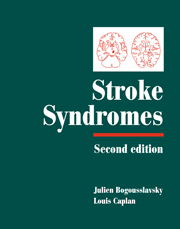Book contents
- Frontmatter
- Contents
- List of contributors
- Preface
- PART I CLINICAL MANIFESTATIONS
- 1 Stroke onset and courses
- 2 Clinical types of transient ischemic attacks
- 3 Hemiparesis and other types of motor weakness
- 4 Sensory abnormality
- 5 Cerebellar ataxia
- 6 Headache: stroke symptoms and signs
- 7 Eye movement abnormalities
- 8 Cerebral visual dysfunction
- 9 Visual symptoms (eye)
- 10 Vestibular syndromes and vertigo
- 11 Auditory disorders in stroke
- 12 Abnormal movements
- 13 Seizures and stroke
- 14 Disturbances of consciousness and sleep–wake functions
- 15 Aphasia and stroke
- 16 Agitation and delirium
- 17 Frontal lobe stroke syndromes
- 18 Memory loss
- 19 Neurobehavioural aspects of deep hemisphere stroke
- 20 Right hemisphere syndromes
- 21 Poststroke dementia
- 22 Disorders of mood behaviour
- 23 Agnosias, apraxias and callosal disconnection syndromes
- 24 Muscle, peripheral nerve and autonomic changes
- 25 Dysarthria
- 26 Dysphagia and aspiration syndromes
- 27 Respiratory dysfunction
- 28 Clinical aspects and correlates of stroke recovery
- PART II VASCULAR TOPOGRAPHIC SYNDROMES
- Index
- Plate section
22 - Disorders of mood behaviour
from PART I - CLINICAL MANIFESTATIONS
Published online by Cambridge University Press: 17 May 2010
- Frontmatter
- Contents
- List of contributors
- Preface
- PART I CLINICAL MANIFESTATIONS
- 1 Stroke onset and courses
- 2 Clinical types of transient ischemic attacks
- 3 Hemiparesis and other types of motor weakness
- 4 Sensory abnormality
- 5 Cerebellar ataxia
- 6 Headache: stroke symptoms and signs
- 7 Eye movement abnormalities
- 8 Cerebral visual dysfunction
- 9 Visual symptoms (eye)
- 10 Vestibular syndromes and vertigo
- 11 Auditory disorders in stroke
- 12 Abnormal movements
- 13 Seizures and stroke
- 14 Disturbances of consciousness and sleep–wake functions
- 15 Aphasia and stroke
- 16 Agitation and delirium
- 17 Frontal lobe stroke syndromes
- 18 Memory loss
- 19 Neurobehavioural aspects of deep hemisphere stroke
- 20 Right hemisphere syndromes
- 21 Poststroke dementia
- 22 Disorders of mood behaviour
- 23 Agnosias, apraxias and callosal disconnection syndromes
- 24 Muscle, peripheral nerve and autonomic changes
- 25 Dysarthria
- 26 Dysphagia and aspiration syndromes
- 27 Respiratory dysfunction
- 28 Clinical aspects and correlates of stroke recovery
- PART II VASCULAR TOPOGRAPHIC SYNDROMES
- Index
- Plate section
Summary
Introduction
Although recognized as early as 1924 by Bleuler, depression and, more generally, mood disorders following cerebral lesions have only been studied systematically in the last 20 years. Initial studies of emotional disorders in brain injuries included patients with various lesions such as surgical incision, traumatic closed head injuries, penetrating head injury and stroke making it difficult to determine the location of the lesion. Some more recent stroke studies suggest a critical role of the anterior left hemisphere in depression, but other authors deny causal contribution of lesion location to depression. The predominant role of the right hemisphere in secondary mania is well recognized, but a consensus is still lacking and further studies are needed to determine the clinico-topographic correlation of disorders, such as apathy, anxiety, catastrophe reaction and pathological laughing and crying sometimes encountered after stroke. These affective disorders are important to consider in stroke patients, since they may negatively influence neurological recovery and may be responsive to treatment.
Specific emotional behaviours, such as disinhibition, denial, indifference, overt sadness and aggressiveness, often occur during the very first days following stroke. They might be overlooked if not searched for systematically with appropriately designed scales. Some of these early behaviours, such as denial, may be related to the late development of depression and anxiety. Prospective studies of mood changes during and immediately after stroke have not been performed yet. Such studies on large samples of patients may permit the delineation of which of these acute emotional behavioural changes are markers for the delayed development of emotional disturbances (Ghika-Schmid & Bogousslavsky, 1997).
- Type
- Chapter
- Information
- Stroke Syndromes , pp. 285 - 301Publisher: Cambridge University PressPrint publication year: 2001
- 1
- Cited by



